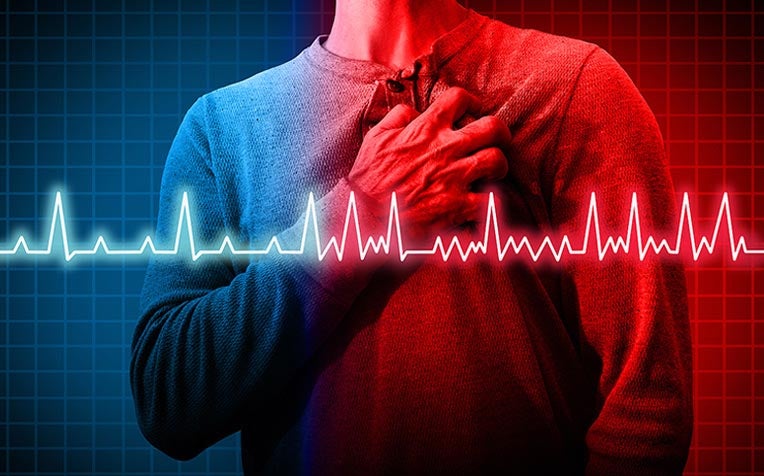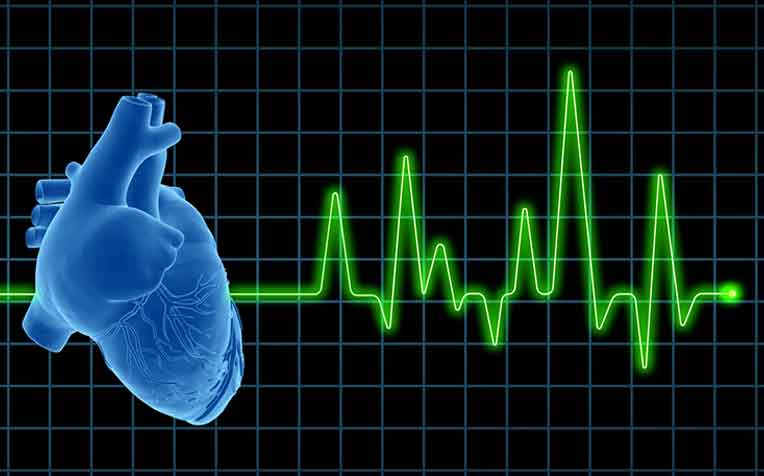1. Ventricular fibrillation causes dangerously fast heartbeats (400-500 beats/minute) and is a common cause of sudden cardiac death.
2. Without immediate treatment, ventricular fibrillation can cause death or severe brain damage within minutes.
3. Most sudden cardiac deaths (81%) are linked to coronary artery disease, with previous heart attacks often involved.

Arrhythmia (also known as irregular heartbeat or abnormal heart rhythm) is the most common cause of sudden cardiac arrest.
How arrhythmia (irregular heartbeat) can cause sudden death
When something goes wrong with the ‘electric circuitry’ of the heart, it can cause the heartbeat to be irregular, fast or slow.
Ventricular fibrillation, an arrhythmia (irregular heartbeat) which causes the lower chambers of the heart to beat too fast, is the most common cause of sudden cardiac arrest.
During ventricular fibrillation, the heart rate can be as fast as 400-500 beats per minute, compared to the normal 60-100 beats. The heart’s lower chambers, which pump blood and oxygen to the body, do not effectively pump blood out of the heart. As a result, insufficient blood is delivered to the brain and the person loses consciousness.
A ventricular fibrillation is a medical emergency and the victim is likely to die within minutes without treatment. Even if the victim survives, there is a high chance of brain damage leading to poor quality of life.
“An extremely slow heart rate can cause sudden cardiac death but it is usually not drastic and sudden, and presents with prior symptoms of giddiness or fainting,” explains Clinical Associate Professor Ching Chi Keong, Senior Consultant, Department of Cardiology and Director, Electrophysiology and Pacing, National Heart Centre Singapore (NHCS), a member of the SingHealth group.
Other heart conditions caused by arrhythmia (irregular heartbeat)
Often, a life-threatening arrhythmia is linked to a heart condition such as:
Coronary artery disease: The Singapore study found that 81 per cent of all sudden cardiac deaths were caused by coronary artery disease (hardening and narrowing of the arteries supplying the heart).
Heart attack: Almost 75 per cent of all sudden cardiac arrest patients show signs of a previous heart attack (myocardial infarction).
Hypertrophic cardiomyopathy: An abnormal thickening of the heart muscle can cause ventricular fibrillation, especially during exertion.
Electrical disorders of the heart: One of these disorders is Wolff-Parkinson-White (WPW) syndrome, characterised by an extra nerve connecting the heart chambers. This can cause an ‘electrical short-circuit’ in the heart, resulting in a rapid heartbeat. Brugada syndrome and long QT syndrome are also examples of electrical disorders.
Ref: R14
Check out other articles on heart health:
Sudden Cardiac Arrest: Early Symptoms, Treatment and Tips
How to Survive a Heart Attack When Alone
Sudden Chest Pains You Shouldn't Ignore
Heart Palpitations: When Are They Serious?
Contributed by















 Get it on Google Play
Get it on Google Play